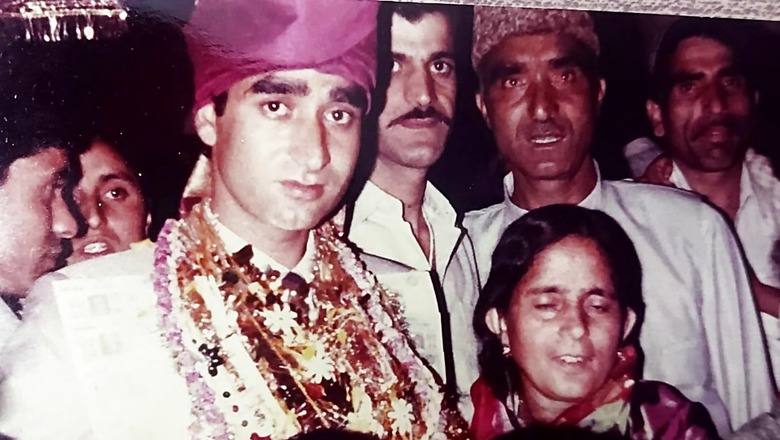
views
Sixteen Yaer Kuel fell in 1993. The sound of trees falling to the ground was just like the sound of finale in death. The drill of chopping continued as the ground buzzed with quake. The ground shook every time the mighty took to the earth. Sixteen Yaer Kuel fell with a thud in the tiny village called Kanikoot in Chadoora, Budgam, as all the village heads watched from a distance. They would now use this expensive wood to construct houses. The trees had stood through decades over the ancestral lands of Radhakrishen Mattoo, for whom they were like brothers. He had avoided using them for his own houses in the village and the city because he loved them dearly. But now, they belonged to those who chopped them off three days after he had fled. The trees just like him— unaccounted, unadopted, uprooted like thousands of Kashmiris.
On a quiet monotonous afternoon of a cold February in 1993, militants had passed on threatening messages to Kamla Devi, wife of Radhakrishen, about leaving the village just like other Kashmiri Pandits had over the years. Radhakrishen, even through kidnapping and resistance during 1990, knew it was finally time to leave his birth village with his wife and son and join the rest of the family at a matchbox-sized, dilapidated accommodation in Jammu. But they made sure they left as if they were going out for a walk, without informing neighbours for safety and without bidding a goodbye to 150 odd labourers who were working for them in the adjoining fields. Kamla was pausing continuously and looking back at the shed behind the house again and again while carrying an overstuffed F.E. PAUL thela, worrying what would happen to the 20 cows and over a hundred chickens. Abandonment has many eyes—she thought.
And a couple of those she would never see again. The Mattoos were later always fixed on the belief that they left a part of themselves behind that day. The departure, unwantingly, started a spell of brokenness and loneliness that only ended with their deaths 20 years later.
ALSO READ | As a Kashmiri Pandit, I Guess I Will Never Like a Tent – Ever
***
With the onset of exodus of Kashmiri Pandits from the Valley in 1990, started a tale, not just of their survival but also of their ancestral lands and houses subsequently being raped. The lanes of Habba Kadal were lined with items from Kashmiri Pandit households being auctioned off. And after that got exhausted, their orchards, fruits borne from trees, whose saplings were watered by battnis, were sold off by the same caretakers who were given the responsibility to protect them. Land mafia took over and locals, in a large number of cases, joined hands with revenue officials and local administration to grab every piece of land they could lay their eyes on. Police in many cases, I’m told, remained a mute spectator, not even prescribing to the law and action as per the Distress Sales Act passed by the J&K Legislative Assembly in 1997. As a result, large number of cases dragged in courts with encroachers providing false documentation to defend their take.
Between thousands of such cases, is the case of the house of Dr Ramesh Tamiri. Dr Tamiri’s family had built a house in Munshi Bagh but in April 1990 they fled to Jammu since neighbours had informed them that their father’s name was on a terror hit list. A Muslim shopkeeper traced their address in Jammu and informed that an employee working with MES (Military Engineer Services) had illegally broken lock of the house and was staying there. They registered a case against the forcible occupant but he had readied a stay order against vacation. He also made fraudulent papers stating that he was sold this house by the original inhabitants.
Dr Ramesh recalls his father’s struggle all through the years. After years of bus rides to courts, one SSP, Amin Shah, helped crack the case by busting the gang involved in fraudulent occupation but forged signatures presented in the court of law were seen as evidence for the stay order. Eventually, feeling exhausted and worn out, as one would after losing a battle, Dr Tamiri’s father sold the house for Rs 6 lakh. The case was also highlighted at UN office in Geneva, as a reference to the tragic visualization of the pain and trauma that people thrown out of Kashmir went through.
***
Similarly, Dr Raminder Singh, who runs an NGO in J&K now, owned 17 kanals of land at Baramulla, which was encroached upon by locals. Raminder’s father chased the case for seven long years before his death in 2014, and now he is scared to pursue the case without support. And he asks repeatedly, “What next? How much compensation is enough compensation? Who can ever compensate for the loss and the trauma of chasing for life?” He has submitted a complaint where he has openly mentioned that against the compensation received, he will donate 20 per cent to district fund and another 20 per cent to the Education Department but still words are falling on deaf ears.
ALSO READ | With Dad’s Name on Hit List, All Threads Were Burnt: A Kashmiri Pandit on Leaving Home
Raj Nehru remembers the rocket launcher of 1991 that hit his house in Bagath, Barzulla, and turned it into a half-burnt bread loaf. He also remembers how his parents were scared what would happen next. Every now and then a few Srinagar locals visited them to persuade them to sell, his father decided to sell at a throwaway price. Raj, on knowing about the act a little too late, tried contacting the DC Srinagar office for complaint, but like all other complaints his too, he says, went into the dustbin.
As you can see, 16 Yaer Kuel was not alone. Across the Valley, over the years, hundreds of walls were being torn down, houses looted, orchards grabbed, and what remained sometimes were just fragments of memories scribbled all over them. Garr. Bei gass garr. Baaki yim che saerei daer. (Home. I want to go home. Everywhere else I’ve lived are rented places), I hear my grandmother saying this as I close in on the dawn.
The Jammu and Kashmir Migrant Immovable Property (Preservation, Protection and Restraint on Distress Sales) Act, 1997 came into being roughly 24 years ago. Recently, the administration also launched an online portal, http://jkmigrantrelief.nic.in, for time-bound redressal of grievances related to displaced persons and their immovable properties. Victims are telling me they’re optimistic one second and tired the next.
Khushboo Mattoo is a Consulting Editor with Network18 and a lifelong student of art. She loves sheer chai and the sound of rabab. She is vocal about everything that involves equality.
Read all minute-by-minute news updates for Uttar Pradesh election results 2022, Punjab election results 2022, Uttarakhand election results 2022, Manipur election results 2022, and Goa election results 2022.
Click here for seat-wise LIVE result updates.



















Comments
0 comment